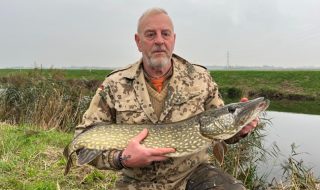Angling and fishery organisations have today welcomed an announcement from the Natural Environment Minister Richard Benyon that plans are being drawn up to remove products containing the dangerous insecticide Chlorpyrifos from domestic sale.
Mr Benyon was responding to strong representations from the Angling Trust, the national representative body for anglers, and fishery owners along the Kennet Valley in Wiltshire and Berkshire following last months’ devastating pollution of all invertebrate life along a 15 kms stretch of this famous chalk stream by a tiny amount of chlorpyrifos which entered the river via the combined sewerage system.
In a recent letter to Mr Benyon Angling Trust campaign chief Martin Salter wrote:
“Experience from other countries as well as the catalogue of environmental disasters caused by chlorpyrifos, of which the upper Kennet is but the latest, must surely tell us that the current controls are simply not fit for purpose. In fact the Angling Trust wants to know why a lethal chemical like chlorpyrifos is allowed to be used anywhere near a river or watercourse. Apparently the 15 kms wipeout of invertebrates between Marlborough and Hungerford may have been caused by as little as a couple of spoonfuls and was almost certainly the result of an irresponsible domestic disposal. We hope you will agree that the the sooner we follow the lead of Singapore and America and ban the domestic use of chlorpyrifos the better off our rivers will be.”
The incident on the Kennet was the latest in a series of scares involving chlorpyrifos, which is regularly used on lawns and golf courses and for treating termites, leatherjackets and frit flies. The same chemical was responsible for wiping out insect life on a large stretch of the River Roding in 1985, the River Wey in 2002 and 2003 and led to a significant number of fish being killed on the River Ouse in Sussex in 2001.
Following the incident on the Kennet, people were advised not to allow water from a stretch between Marlborough and Hungerford to come into contact with their skin.
In America the US Environment Protection Agency has placed limits on its domestic use and the chemical was banned outright in Singapore for use in termite control in 2009.
Mr Benyon, who is also the Conservative MP for Newbury, has asked officials to draw up measures to restrict its sale in Britain. He said:
“I’m firmly on the side of those who want to make sure this never happens again.
I think something as toxic as this should only be available to people with the qualifications to use it safely. I’ve asked Defra’s chemical regulations directorate to provide me with advice and I will act upon it. We want to make sure in the medium to the long term that we are protecting rivers like this from pollution incidents, whether they come agricultural use or personal use. Somebody could have just been cleaning out their garden, trying to clean algae out of their fishpond. We don’t know.”
Mr Benyon added:
“In any river such an incident would cause me great concern but I am particularly upset that this should happen in my local river. I am really angered to hear of the devastating impacts for the ecology of the Kennet. This type of pollution is totally unacceptable.”
Mark Lloyd, Chief Executive of the Angling Trust, welcomed Mr Benyon’s support. He said:
“We have been pushing for much tougher controls on how this stuff is sold. This is a product that is supposed be for use by professionals only yet it can be bought on-line by any Tom, Dick or Harry who will then be in possession of an environmental time bomb. It is plain wrong that chlorpyrifos is freely available to everybody for without proper disposal methods it can cause a huge amount of damage to rivers and streams and the wildlife they support.”
He added:
“We are also calling on the government to improve the facilities for the disposal of dangerous chemicals. Up and down the country people will have bottles and tins of all manner of pesticides which, if rinsed out into the drains can be fatal to insects and the birds and fish which feed off them.”
The Angling Trust campaign has been picked up by the national media including the BBC, the Times and the Telegraph.





